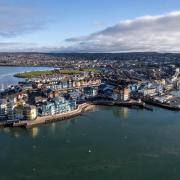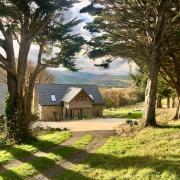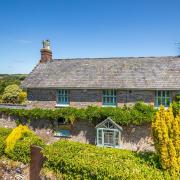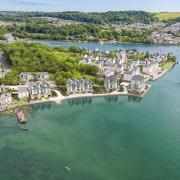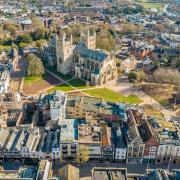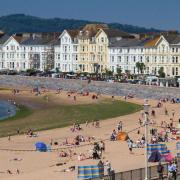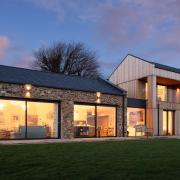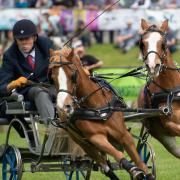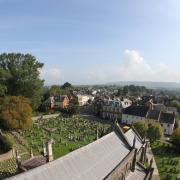LINDA SAGE reflects on the winter of 1963 as Whiddon Down and surrounding villages were cut off by snow

On Boxing Day 1962 the first snowflakes began to fall. Dad said, ‘”Don’t get your hopes up, maid, t’will be gone by mornin’.” Wishful thinking on his part - the flakes gathered pace.
They started to settle. Everywhere became shrouded in white. But my dream of a white Christmas turned into a nightmare that lasted months for the whole of the country.
Life was great for village kids. No school. The minibus from Whiddon Down to Drewsteignton Primary was unable to get through the winding lanes. The sun sparkled on a sugar coated landscape - endless days of sledging, snowballing and making snowmen.
In the New Year a thaw set in. This was only a temporary reprieve as more snowstorms swept the West Country and everything froze solid. Icicles hung down from gutters like stalactites.

The wind whipped snow into great peaks and drifts. Whiddon Down was cut off. The telephone was the only link to the outside world if you were fortunate enough to have one. We weren’t.
A hundred stranded motorists and lorry drivers abandoned their vehicles on the main A30 and sought refuge in Whiddon Down, spending the night in the village hall with locals helping out with blankets.
My dad waded several miles chest high in snow during the blizzard when the Devon Contactors van he was travelling in became stuck in a drift. He was exhausted. A television crew set up in the centre of the village outside the Post Inn; Dad and a lorry driver relived their experiences for Spotlight South West.
Carol Baker from neighbouring Chagford recalls: “My mum went into labour and the ambulance couldn’t get down the road to Orchard Meadows.

“My brother, David, eventually arrived safe and well on 12 February. My elder brother Chris and a friend from the village made an igloo in our garden. They shored up the inside with wood and the igloo lasted until May!”
Farmers were unable to reach livestock in their fields. Hay was dropped by helicopter, but many animals perished. Emergency supplies of food were also delivered by helicopter to cut off villages and isolated houses.
Mum kept a well-stocked larder. Baked bread. Made marmalade from Robertson’s Ma Made (tins of concentrated Seville oranges) with the addition of water and sugar. Eggs and milk were delivered from a local farm.
Mrs Sellick managed the journey to the village in her tractor no matter what the conditions and pulled crates of milk up to the cul-de-sac. I don’t recall being hungry but potatoes formed a great part of our diet.

Dad grew Desiree and Maris Piper on our vegetable plot and stored them in the shed, along with strings of onions. I ate sugar sandwiches and Dad soaked bread in Oxo for breakfast. Maybe things were more difficult than I realised at the time.
Our post-war council house in Barn Close didn’t have the luxury of central heating or double-glazing. We relied on paraffin heaters when the weather was particularly cold, putting up with the fumes. Window panes frosted up on the inside.
Early one morning Dad opened the back door to a solid wall of snow. We could hear voices outside and the chink of shovels. I scraped away at the leaf-shaped patterns on the window with my fingernails and huffed on the glass to clear a space to watch our kind neighbours dig a trench to our house.
They worked round to the back garden so Dad could make a path to the coal shed. At last, a fire and hot water. There was a great deal of community spirit during this troubled time.
After several weeks, a party of Royal Marines, stationed at Lympstone camp, were employed to dig out abandoned vehicles and clear the roads for motorists to get moving again. This was the beginning of life getting back to normal.
Conditions on Dartmoor
- Conditions on Dartmoor were treacherous with freezing temperatures and gusts of wind up to 90 mph creating 15-20ft drifts.
- Hundreds of sheep and wild ponies were buried in the snow.
- Six rookie soldiers were caught up in a blizzard whilst on a map-reading exercise. They sought refuge in a derelict property when their tents blew away and were rescued by helicopter, hungry and suffering from frostbite.
- Fifty passengers spent the night on a train on the edge of Dartmoor.
- A goods train also got stuck and when a snowplough went to clear the line this got stuck too. Everything froze solid and it took eighty men over a week to dig them out and get them up and running again.
How the rest of the country fared
- Temperatures of -20c were recorded in some parts of the UK during the worst weather for 200 years.
- Power lines were brought down by the storms. Electricity supplies to hospitals were cut off without warning. Shops and offices kept going by candlelight.
- Half the wild birds in the country starved to death, as they were unable to find food.
- The Thames froze over. In some areas people drove cars and rode bicycles to work on the ice.
- The sea froze as waves crashed onto promenades and blocks of ice formed in dockyards, immobilising ships.
- As underground water pipes froze emergency water tankers brought supplies to towns and city streets. Water was rationed.
- There was a shortage of vegetables as farmers were unable to dig them out of the ground. When they did manage to get them out transport was unable to get through to collect them.
- Coal was in short supply as heaps froze. This affected industry, train engines and homes.








